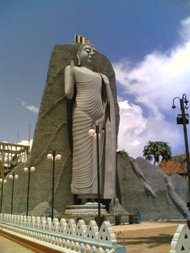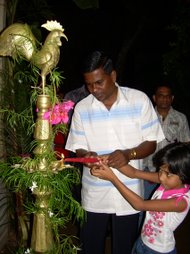How can HSBC loan lead to Eastern development?
- Daily Mirror
By Jehan Perera
The government completes 22 months with the general population facing an economic crisis that is worrying the government. The concern about the economic crisis faced by people is most pronounced in the urban areas, where the self sufficiency that buffers the rural economy is not at all present. The rate of inflation has touched 20 percent, with prices of essential commodities such as milk, rising by an even greater percentage. The government blames the increase in world prices and also the depreciation of the rupee as the cause for the rise in prices. To this must be added the printing of billions of rupee notes by a cash strapped government that have made more money chase after the same goods.
This crisis is felt all over the country, and not only in Colombo, but even in President Mahinda Rajapaksa’s home base of Hambantota. Some of those who worked for the President’s electoral victory in November 2005 are deeply disappointed, and angry, as I found last week in Hambantota. The constant complaint is that inflation has made life very difficult for the masses, including themselves, and the difficulties extend to the rural areas also. There were allegations that the government was only laying foundation stones of development projects, and that corruption swallowed most of the initial investment before government funding came to a halt.
A major problem faced by the government is its budget deficit. By printing large sums of currency notes the government has been trying to meet its basic financial obligations, such as paying of salaries to government sector employees. It is also resorting to new taxes, such as on mobile phones, to enable the government to meet its bills. But the printing of rupee notes and increasing taxes are only helpful in meeting the government’s domestic obligations. It will not help in meeting the country’s international obligations. If the government is not earning enough foreign exchange from the country’s exports, remittances from workers abroad and grants by donor agencies, it needs to go in for loans.
Sovereign bond
The government’s plan to raise USD 500 million through the issue of a sovereign bond on the international market has ignited a controversy within the country. On the one hand, the foreign exchange that comes in through this transaction can give the government breathing space to meet its financial obligations. On the other hand, there is apprehension that an international loan taken on commercial terms, with no specific limitations on its use, could be used for expenditures that are in the nature of consumption rather than investment.
Taking a loan makes perfectly good economic sense if it is used for productive purposes, where the loan leads to the building up of an economic asset that leads to the generating of a stream of income that could be utilized to repay the loan. However, if a loan is taken at commercial rates of interest, and is used for the purpose of consumption without creating a new economic asset, then repaying the loan is going to be a big burden in the future on the people who are already over burdened with taxes and inflation. Whether the money that becomes available as a result of the loan is used for investing in economic assets or is used for consumption which can take many forms, including salaries and weaponry or for subsidies for short term electoral gain, become an important question.
The government’s main justification for floating the bond on the international market is that it needs investment funds to develop the war-destroyed economic infrastructure in the east. The government argues that it is unable to get concessionary finance from donor agencies because Sri Lanka is now a middle income country. Unlike commercial loans that have a high rate of interest but give the borrower flexibility in the usage of those funds, concessionary loans from donor agencies have low rates of interest and strict conditions placed on how they may be utilized. The tragedy is that four years ago the country’s main donors pledged USD 4.5 billion to develop the country, but on the condition that the peace process continued.
The present low intensity war that the government and LTTE are engaged in creates an unstable and insecure environment especially in the north and east. The militarization of daily life in the north and east is illustrated by the requirement in Jaffna that every resident over the age of 10 years should carry around an identity card issued by the military authorities. Even areas that are under the control of the government are subject to regular LTTE infiltration and guerilla attack. The prevailing situation in the country makes it unlikely that the government will be able to fulfill its promise of using the proceeds of the sovereign bond to develop the infrastructure in the east.
Urgent priorities
The stark reality is that the government has yet to resettle some of the tsunami victims in the east who were displaced from their homes over two years ago. In these circumstances, it is almost certain that the foreign exchange that is made available to the government by the sovereign bond will not be utilized for infrastructure development in the east. Instead, that money will be utilized to meet the most urgent priorities of the government. Chief amongst these would be to face the military challenges that have arisen from its strategy, to meet the government’s considerable salary bill and to reduce the cost of living even temporarily through subsidies.
In considering which of the alternatives the government is likely to take, it is necessary to understand that the needs of the military become paramount in a situation of military conflict. It is no secret that the government requires substantial economic resources to combat the unconventional military tactics of the LTTE. The LTTE’s deployment of micro light aircraft to bomb the international airport and oil storage tanks a few months ago sent shock waves through the country, and prompted the government to find its answer in ultra sophisticated MiG 29 fighter aircraft.
Despite protests that the expenses on these aircraft are disproportionate to the threat posed by the LTTE aircraft, the government has shown itself determined to go ahead with the deal that is reported to cost as much as USD 300 million.
It can also be expected that the army, which is doing the bulk of the fighting against the LTTE, will have its own demands for equally significant military procurements. So long as the war continues the conditions in the north and east will not permit any major infrastructure development projects. A government that has been unable to implement such infrastructure projects in other parts of the country, even in the President’s home base of Hambantota, is unlikely to be able or be willing to make the commitment that such a choice entails. The more likely scenario is the utilization of the proceeds of the sovereign bond for the purposes of consumption, without the prospect of generating economic assets that could provide a larger stream of income to repay this loan.
Politics
The issue of the loan has now become unfortunately politicized with the major opposition party challenging its viability and legitimacy. However, precisely for this reason it has also become highly publicized instead of being slipped through without pubic discussion like most government decisions.
Opposition Leader Ranil Wickremesinghe has stated that a new government headed by him will not repay the loan and will even cancel the license of the Hongkong Bank, which is one of the banks that is floating the bond on the international market, if it is found to be contrary to Sri Lankan law. He has also warned that he will call on the people to demonstrate outside the HSBC in the event of further economic hardship to the people.
Critics of Mr Wickremesinghe’s position have pointed out that international law is clear in affirming the duty of a successor government to honor the legal obligations of predecessor governments. However, international law is also a rapidly evolving arena of morality and ethical responsibility. The call of former colonies for reparations for past injustices and of comfort women for past violations of their human rights, and the positive responses of some of the culprit governments, are part and parcel of an evolving international community. The concept of corporate social responsibility in economic contracts may become a new feature of international law in the future.
The issue of the sovereign bond is enabling Mr Wickremesinghe to change his image with the general public who are likely to be receptive to the economic rationality of his arguments. Economic rationality notwithstanding Mr Wickremesinghe has had to live down a reputation for being too oriented towards the international community. In the past and even today racist elements in the government and the government’s nationalist allies taunt him for being too deferential towards the international community and for being prepared to divide the country at their behest. But the issue of the sovereign bond has given him a just cause to project a more nationalistic image, one which he might well wish to consolidate in event of returning to power in the future.
What is tragic about the unfolding drama is that once again Sri Lanka is heading on a course of confrontation with more conflict within itself and with those who would rather be its partners.
The Hongkong Bank has been doing business in Sri Lanka for over a hundred years and is a symbol of the international economic presence that has linked the country to the global economy. Now it is caught in a pincer between contending political forces. A country that needs healing and reconciliation is growing more polarized and the conflicts it is involved in are becoming more intense. Sri Lanka needs peace at all levels if the economic resources of the international community are to bring development and prosperity to the people.
"Star Lanka Online" Our NEW Web site And Web TV Channel Launched
TFGE , The Future Global Educational Center Has Launched
the official web site, called
*** Star Lanka Online Dot Com ........................
www.starlankaonline.com will be completed in very near future....
*** Star Lanka Online TV Channel,..................
Just One Click ahead ...
Now you can watch "Star Lanka Online TV" channel broadcasts from Matara, Sri Lanka in most part of the day. Still we are keeping a test transmission also. There is a link right side of your hand to watch our TV channel. You can watch (Click On the Box) live channel on this site without going to another site to watch the TV. and also recorded parts, following the below link.
the official web site, called
*** Star Lanka Online Dot Com ........................
www.starlankaonline.com will be completed in very near future....
*** Star Lanka Online TV Channel,..................
Just One Click ahead ...
Now you can watch "Star Lanka Online TV" channel broadcasts from Matara, Sri Lanka in most part of the day. Still we are keeping a test transmission also. There is a link right side of your hand to watch our TV channel. You can watch (Click On the Box) live channel on this site without going to another site to watch the TV. and also recorded parts, following the below link.
Place your Own Ad Here
Tuesday, September 11, 2007
How can HSBC loan lead to Eastern development?
Subscribe to:
Post Comments (Atom)





















































No comments:
Post a Comment